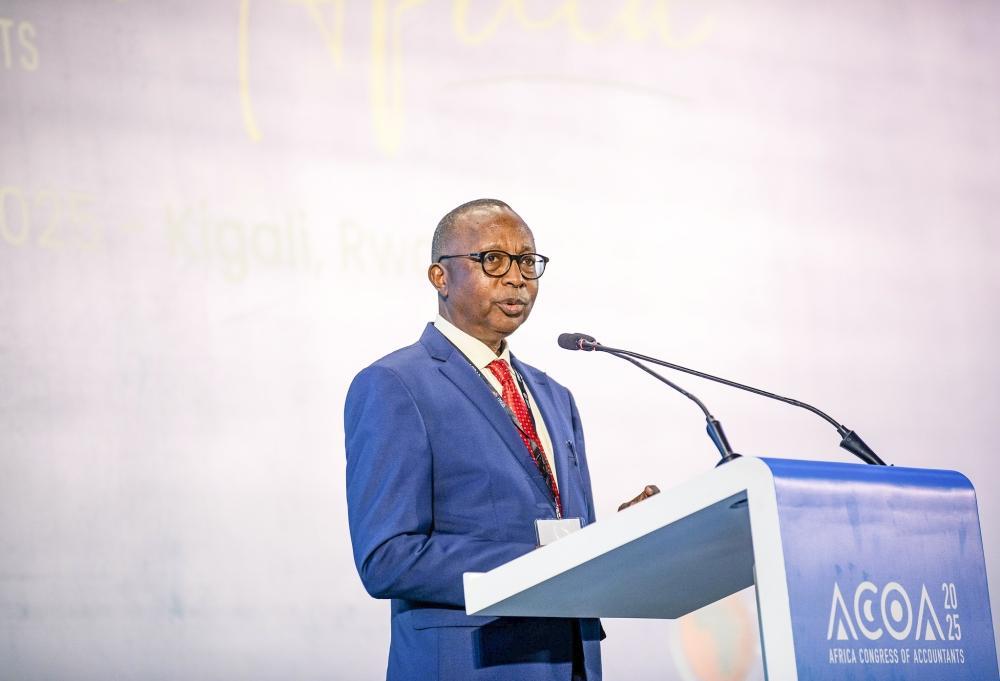Africa-Press – Rwanda. Rwanda is exploring ways to increase the number of professional public accountants by introducing professional accountancy pathways early, aligning formal education curricula with professional certification programmes, among other initiatives.
According to the Institute of Certified Public Accountants of Rwanda (ICPAR), the country needs at least 8,441 professional accountants by 2035 to meet national demand. Currently, only 1,147 are registered, a gap that undermines financial oversight.
The Minister of Finance and Economic Planning, Yusuf Murangwa, told The New Times following the opening of the Africa Congress of Accountants (ACOA) at the Kigali Convention Centre on May 6—an event running until May 9 under the theme Creating Value for Africa—that various initiatives are in place to strengthen the accounting profession.
“There are secondary school students already studying accountancy, but they haven’t been fully integrated into the professional framework,” he said, highlighting that the government is working to introduce professional accountancy pathways early in partnership with the Ministry of Education and ICPAR.
This, the Minister added, will significantly boost numbers in the next five to ten years.
Murangwa pointed out that although many universities teach accountancy, the curricula often lack alignment with professional certification programmes, something that has begun to change but still needs improvement.
“For those who graduated earlier, there are ongoing programmes aimed at upgrading their skills. The number of professional public accountants we need is significant,” he noted.
Role of accounting profession
During the congress, participants emphasised the critical role accountants play in national development, insisting that the profession has potential to drive transformation through knowledge transfer.
“In Rwanda, the profession continues to play a vital role in strengthening our institutions and supporting our ambition to build a knowledge-based economy driven by efficiency, trust, and innovation,” Murangwa noted. “As Africa rises, we must ensure that our growth is anchored on strong systems and ethical leadership.”
More than 2,000 professional accountants and finance experts from across Africa gathered for the bi-annual event.
Obadiah Biraro, President of ICPAR, indicated the institute is working with the Ministry of Finance and other stakeholders to grow the profession.
“Our goal is to professionalise accountancy. The institute exists, the need is clear, and initiatives like this international congress allow us to learn from others,” he said. “I encourage young people to register and begin their journey as accountants.”
Emmy Claude Nizeyimana, Associate Director of Professional Development Services at ICPAR, outlined key measures being implemented to increase the number of professional accountants.
He said the shortage has led to errors by non-professionals, sometimes unintentional, due to lack of training and accountability. “Professionals are registered, accountable, and mindful of their reputation, which encourages accuracy and responsibility.”
To meet the growing demand, ICPAR has increased the number of examination sittings from two to four annually, providing more opportunities for candidates to qualify.
“We’ve also aligned our curriculum with the Rwanda Education Board (REB). A student in S4 can start the first part of the Certified Accounting Technician (CAT) qualification, continue with part two in S5, and complete part three in S6. With support from REB and MINEDUC, this integration can be fully adopted,” he observed.
Nizeyimana added that the government supports top-performing, financially disadvantaged accounting graduates to pursue the CPA qualification.
Need to fix shortage of accountants
Vedaste Ndikumana, a professional accountant at the Rwanda Agriculture and Animal Resources Development Board (RAB), said the shortage of accountants weakens financial oversight.
“Inadequate financial controls increase the risk of fraud, corruption, and mismanagement, especially in public institutions and NGOs. SMEs lack proper accounting support, limiting their growth, tax compliance, and investor appeal,” he said.
Ndikumana indicated that limited training capacity, high certification costs, low awareness, brain drain, and weak private sector investment in talent development, are some of key ccontributing factors to the current shortage.
He suggested that there is a need to subsidise training, strengthen partnerships with universities and global bodies, offer enhanced career guidance, support continuous development (CPD), online learning platforms and employer-backed certification, as well as creat competitive local opportunities to retain talent.
Pelagie Kayirebwa, another professional accountant at Nyanza District Hospital, maintained that the shortage results in poor financial reporting, weak planning, and increased mismanagement risks.
“Without accounting support, many businesses can’t access finance, which restricts growth and undermines investor confidence,” she said. “It compromises the reliability of financial statements,” she noted.
Kayirebwa called for expanded access to accounting education, more scholarships, and alignment with international standards.
She also emphasised promoting the profession among youth, and encouraging public-private collaboration to bridge the gap.
For More News And Analysis About Rwanda Follow Africa-Press






